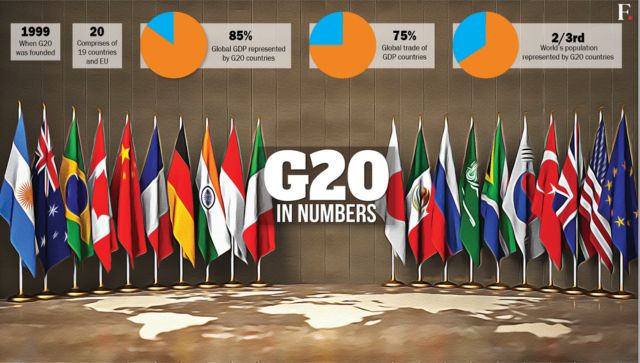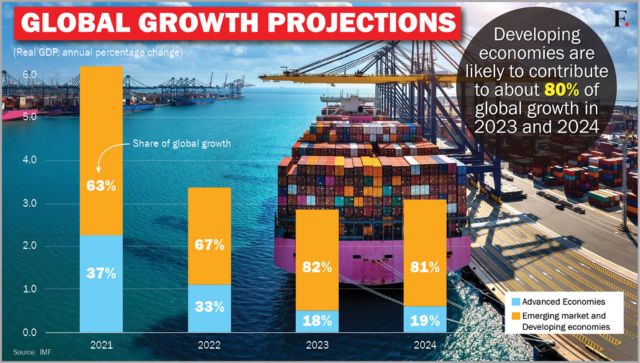Why India’s G20 presidency is significant
India assumed the presidency of the G20 group at a time when geopolitical tensions are high and the world is witnessing economic instability. At such a juncture, New Delhi has decided to be the ‘voice’ of the Global South

With India leading the G20 agenda, it has decided to focus on being a 'voice' of the Global South. File photo/Reuters

India’s Group of Twenty (G20) presidency is underway, with New Delhi slated to host the final summit in September. G20 meetings are being held across the country as India uses the forum to promote the theme of “Vasudhaiva Kutumbakam” or “One Earth, One Family, One Future”.
New Delhi at the helm of G20 has been significant owing to multiple factors, especially as the troika of G20 presidencies – Indonesia, India and Brazil – comprises all developing economies.
What are India’s goals for its one-year G20 presidency and how it offers a momentous opportunity to the country? Let’s take a closer look.
Related Articles
What are India’s G20 priorities?
India wants its presidency to be “inclusive, ambitious, decisive, and action-oriented”. With that aim, it has decided to focus on six priorities.
Green Development, Climate Finance and LiFE: Climate finance and technology, along with “ensuring just energy transitions for developing nations across the world”, are key priority areas for India during its presidency.
According to the Ministry of External Affairs (MEA), with LiFe, a “behaviour-based movement that takes from the country’s rich, ancient sustainable traditions, India plans to “nudge consumers, and in-turn markets, to adopt environmentally-conscious practices”.

Accelerated, resilient and inclusive growth: India is concentrating on areas that can usher in structural transformation, such as promoting labour rights and secure labour welfare, addressing the global skills gap and so on.
Accelerating progress on Sustainable Development Goals (SDGs): India has already had success in getting the G20 members, which includes 19 countries and the European Union, on board with this goal. Following the G20 development ministers’ meeting in Varanasi earlier this week, foreign minister S Jaishankar said India bagged its “biggest achievement” as the group unanimously agreed to an action plan to speed up progress on SDGs and on sustainable development lifestyles, reported Times of India (TOI).
Technological Transformation and Digital Public Infrastructure: According to MEA, India will endorse a “human-centric approach to technology, and facilitate greater knowledge-sharing in priority areas like digital public infrastructure, financial inclusion, and tech-enabled development in sectors ranging from agriculture to education”.
Multilateral Institutions for the 21st Century: India will push for a “more accountable, inclusive just, equitable and representative multipolar international system” that is capable of addressing the concerns of this century.
Women-led development: Not just women empowerment and representation, India will emphasise bringing women to leading positions to bolster socio-economic development.
ALSO READ: What is the G20 and how has it led in times of global crises?
Why is India’s presidency significant?
India assumed the G20 presidency in December last year and will continue to hold it till 30 November 2023.
India steering the G20 agenda has come at a time when the world is making a post-COVID-19 recovery, while also facing challenges such as global economic stability, Russia’s war in Ukraine, and heightening food and energy insecurity.
As Hindustan Times (HT) noted, G20 has always recognised “collective action and inclusive partnership” among the developed and emerging economies.
This sentiment was reiterated by Prime Minister Narendra Modi last December as he underlined India’s G20 outlook and called for international cooperation to deal with global challenges of “climate change, terrorism, and pandemics”, which he said can be “solved not by fighting each other, but only by acting together”.
With India at the helm of G20, it has decided to focus on being a “voice” of the Global South.
Global South is used to refer to developing countries in Asia, Africa and South America, while Global North includes the United States, Canada, Europe, Russia, Australia and New Zealand.
According to the International Monetary Fund (IMF) estimates in January, global growth will slow to 2.9 per cent this year; while emerging market and developing economies will make up for around 80 per cent of the global growth this year and the next.

As G20 members represent over 85 per cent of global GDP, 75 per cent of global trade and two-thirds of the world’s population, this multilateral platform “holds a strategic role in securing future global economic growth and prosperity”, reported Politico.
With its Presidency, India has the perfect opportunity to amplify the issues plaguing the poor and developing world in front of the developed countries.
According to HT, “India can bridge the gap that exists between the Global North and the Global South on issues like climate change, renewable energy, intellectual property rights, carbon emissions, and trade”.
As India aims to emerge as a prominent player on the global stage, G20 is providing the chance for the country to prove its mettle by not only raising international issues but also offering solutions. The summit serves as a platform for India to showcase its growth and propose some of its models to the world as possible solutions.
Amid the ongoing war in Ukraine, which has triggered immense human suffering, hit supply chains, increased inflation and threatened growth, India has the elbow room to use its friendly relations with Russia to convince it to at least join the negotiation table. India could “use its platform to address the Ukraine conflict, strategising for peace and a path toward reconciliation as much as possible,” Mohit Anand, a professor of international business and strategy at the EMLYON Business School in France, wrote for Politico.
Although G20 does not directly engages in resolving security issues, these conflicts still impact the global economy, and hence, India could “lead the way” in addressing these concerns, according to HT.
The current geopolitical tensions and economic situation pose a challenge for India which will have to charter a “delicate” balance while tackling the East-West and North-South conflicts.
As Rajiv Bhatia and Manjeet Kripalani of Indian think-tank Gateway House told Reuters, this is India’s moment to transform from being a “rule-taker to being a rule-maker”.
With inputs from agencies
Read all the Latest News, Trending News, Cricket News, Bollywood News,
India News and Entertainment News here. Follow us on Facebook, Twitter and Instagram.
also read

Australian PM Anthony Albanese to attend G20 Leaders' Summit in New Delhi
Albanese will be among the leaders of G-20 nations who are scheduled to attend the summit under India’s presidency in New Delhi this September

'India has zero tolerance policy against corruption': PM Modi in G20 Anti-Corruption Ministerial Meeting
The prime minister also mentioned the enactment of the Economic Offenders Act in 2018 under which the Indian government is aggressively pursuing economic offenders and informed about the recovery of assets worth over 1.8 billion dollars from economic offenders and fugitives

How Bharat Mandapam embodies India's inspiration from tradition and pursuit of excellence
It will serve as an important platform to showcase the hard work of our artisans and craftsmen, contributing to Atmanirbhar Bharat and 'vocal for local' campaigns


